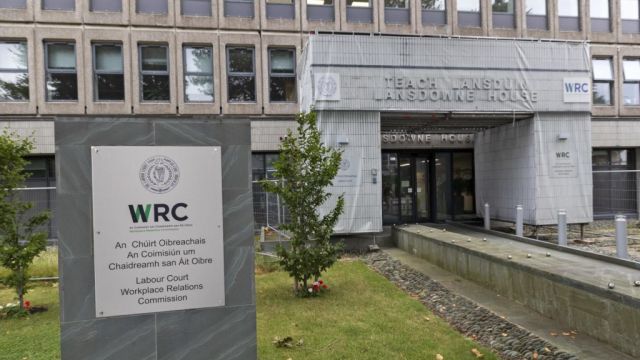A Cork-based charity has been ordered to pay its former financial controller €75,000 in compensation after it was found to have penalised her after she had made a protected disclosure.
The Workplace Relations Commission ruled that Suzanne Pictor had been “targeted, sidelined and penalised” as well as having her role diminished as a direct result of making protected disclosures while working at Matt Talbot Adolescent Services.
In particular, the WRC said the charity’s failure to process her application for pay restoration to which she was entitled was penalisation.
However, it ruled that Ms Pictor had not been unfairly dismissed from her job with the charity in 2022 as a genuine redundancy situation had existed at the time.
The charity, which provides drug treatment services for teenagers and young adults, denied that the disclosures made by Ms Pictor constituted protected disclosures and also that it had penalised her.
Ms Pictor worked as financial controller and administration coordinator at the charity after she joined it in October 2008 until she was made redundant on February 11th 2022.
She told the WRC that she made a protected discourse in 2019 and another one the following year.
As a result, Ms Pictor claimed she suffered a litany of acts including the failure to allow her to apply for pay restoration and the failure to align her pay to a HSE salary scale.
In addition, she alleged she was sidelined and had some of her duties removed which she claimed constituted penalisation under the Protected Disclosure Act 2014.
Finally, she maintained she was penalised by being made redundant which she claimed represented an unfair dismissal.
Ms Pictor gave evidence that she submitted a protected disclosure to the HSE in July 2019 in which she raised “significant concerns” about “spending, appointments, HR related matters and governance issues.”
In particular, Ms Pictor said she highlighted a misuse of funds as well as how appointments were not aligned to HSE salary scales and board members were not being notified promptly.
She also raised concerns about an alleged bogus “redundancy” where the post still existed and was filled the following week, while staff were told the person had retired.
Ms Pictor said procurement processes in the charity were also being abused with money spent on external consultations on work related matters.
She claimed she had “nowhere else to go” as she could “only go to the CEO.”
Ms Pictor told the WRC she made a second disclosure in January 2020 about another expense which she was requested to pay where there had been no procurement process and which was for an excessive amount for a charity to pay.
Counsel for the charity, Denis Collins BL, claimed the HSE had found no evidence of wrongdoing based on the protected disclosure made by the complainant.
He also claimed her grievance was linked to personal difficulties with the charity’s chief executive.
In her ruling WRC adjudication officer, Lefre de Burgh, said Mr Pictor’s dismissal was substantively fair as there was a genuine redundancy situation as there had been a significant reduction in HSE funding following the closure of its Cara Lodge treatment centre.
Ms de Burgh said she did not accept that the redundancy was the last act in a pattern of penalisation.
She noted that the role of the chief executive was also made redundant at the same time.
Ms de Burgh said there had been genuine restructuring within the charity due to a substantial cut in its funding.
However, the WRC ruled that Ms Pictor had made a protected disclosure and that she had been penalised by the then chief executive “and to a lesser extent by the board.”
Ms de Burgh said a key issue appears to have been the appointment of the then chief executive who seemed to have had “little in the way of relevant qualifications or experience.”
She stressed that it was fully accepted there was no suggestion of any individual enriching themselves or anyone else in respect of how funds were used.
The WRC official claimed the concerns and protected disclosures related to “somewhat profligate” use of public and charitable monies.
In relation to the refusal to consider her application for pay restoration, Ms de Burgh said Ms Pictor had set out very cogently why the chief executive’s approach to it constituted a fundamental misunderstanding of the purpose of the exercise.
She said the tone and content of some of the correspondence received by Ms Pictor from the charity was “extraordinary.”
Ms de Burgh said she did not accept the charity’s argument that the issues which occurred were “interpersonal difficulties” and said Ms Pictor’s disclosures “went significantly beyond that.”
She found the evidence of board members about what constituted penalisation was incorrect.
Ms de Burgh said she accepted the submission by the complainant’s counsel Lorna Madden BL that she was “a bother to the organisation” due to her protected disclosures which had precipitated how she was treated and ultimately penalised.
The WRC ruled that Ms Pictor had established that she had a reasonable belief of things which indicated one or more instances of wrongdoing and that she disclosed them appropriately.
Ms de Burgh awarded her compensation of €75,000 and directed that the amount be paid by the charity within 42 days of the ruling.
However, the WRC dismissed a series of other claims made by Ms Pictor including ones relating to pay restoration and having her salary assigned to HSE pay scales.







